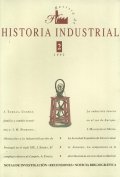Obstacles to industrialization in nineteenth-Century Portugal
Abstract
Portugal shared many of the obstacles facing other European countries on the route to modern industrialization: traditional agricultura1 structures, small domestic markets, difficult integration into the international economy, scarce capital resources, insufficient entrepreneurial and technical skills and high illiteracy rates. But, in Portugal, these formed still greater impediments than those to be found in late developing European countries and the vicious circle of poverty was definitely at work in the combination between unprogressive agriculture, slow and imbalanced urbanization and restricted home demand. Natural endowments could hardly be taken as beneficial, either, and foreign trade, thwarted by over specialization, did little to compensate for the smallness of the domestic market. So, in the nineteenth century, both structural and historical conditions combined to raise almost unsurmountable obstacles the industrialization of Portugal. In this light, the divergent path of the Portuguese economy in the late nineteenth and early twentieth centuries compared to other backward nations of Europe is not at all surprising. In fact, Portugal was a very unlikely industrializer.
Downloads
Downloads
How to Cite
Issue
Section
License
Copyright (c) 1992 Jorge Miguel PedreiraWe have been applying a Creative Commons Attribution license (CC-BY) since 2019, before that year we had a partial open access policy, which included open access for the first two months after publication, followed by an embargo policy for non-subscribers, as access to the last 4 published issues was restricted to journal subscribers. In contrast, early-view articles were always open access prior to publication in an assigned volume. Until 2024 the access to the last 4 published numbers was restricted to those who were subscripted to the journal.
The author assigns all rights to the publisher. Creative Commons
The author who publishes in this journal agrees to the following terms:
- The author assigns all intellectual property rights exclusively to the publisher for the entire duration of the applicable intellectual property rights. The University of Barcelona holds the copyright ownership of the contents published in the journal.
- The publisher will distribute the texts under the Creative Commons Attribution License, which allows others to share the work, provided that they acknowledge the authorship, its initial publication in this journal, and the conditions of the license.





